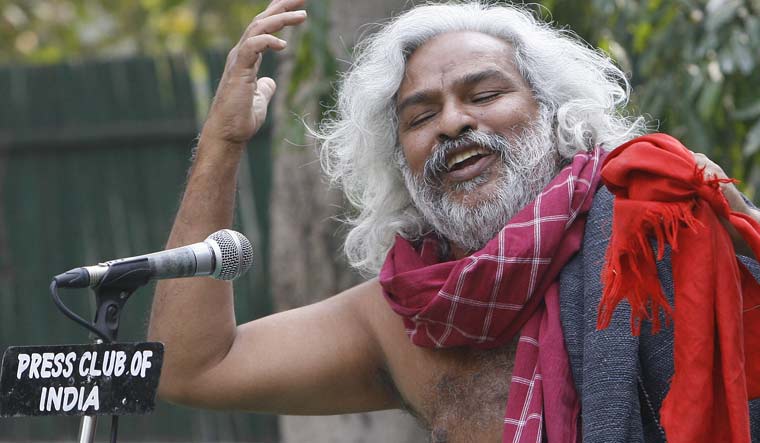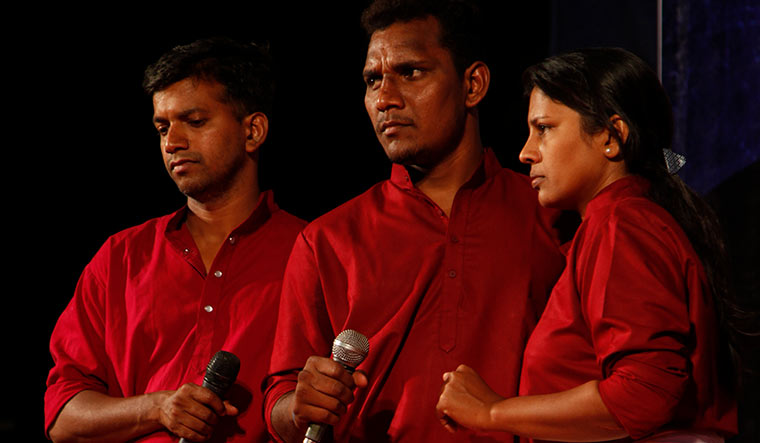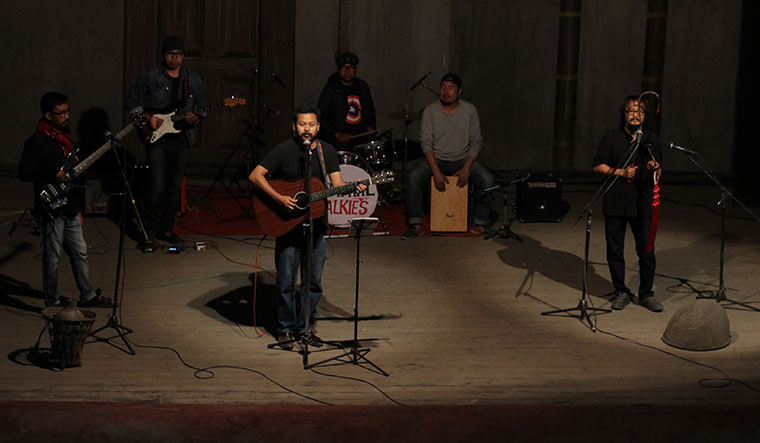Who are you? What you even doing in here?
Pardon my ignorance, but lately too many immigrants in India
Did you sneak in through the border? You look Chinese
I ain’t racist, I just judged you based on how your stupid face is
See, you got little eyes and no eyebrows
What, you think you Indian? Ha, I doubt!
THESE PROVOCATIVE LYRICS by rapper Big Deal would probably sit right with the current political climate; one in which many Assam residents have lost their ‘Indianness’ thanks to the final list of the National Register of Citizens. Born to a Japanese mother and an Odiya father, Samir Rishu Mohanty, aka Big Deal, also felt “un-Indian” while at boarding school in Darjeeling. “I would be teased for my small eyes and un-Indian features,” says the Bengaluru-based rapper. “Most songs have been written from my own experience. Them having a social [relevance] is merely a coincidence.”
Mohanty, 29, took to rapping after watching 8 Mile, the 2002 Hollywood film on American rapper Eminem. “Growing up, it almost felt like I was not good at anything. But watching this film changed my life as it was so inspirational. So, I took up [rapping] as a hobby and it evolved into a full-time thing,” he says. His songs are in Odiya and English; topics vary from racism and police brutality in the northeast to student suicides. Language is clearly not a barrier for Mohanty, whose songs ‘Mu Heli Odia’ and ‘Khusi Ta’ about the people of Odisha have garnered more than 1.5 million views together. He says wants his music to do the talking.
All for justice
KABIR KALA MANCH is a troupe of ten musicians modelled on the Bhakti movement saints like Tukaram and Eknath, who sang in the streets about social issues. “Later came activists like Mahatma Phule and Babasaheb Ambedkar,” says Sagar Gorkhe, president of the troupe. “In the 1980s, Maharashtra saw some street and stage performers trying to spur change like Sambhaji Bhagat and Vilas Ghogre. After that, there was a vacuum of socially conscious artists. Kabir Kala Manch was formed in the wake of the 2002 Godhra riots.” Three of the musicians are full-time members while the others have regular jobs on the side. “The form of expression keeps changing between plays and songs,” says Gorkhe. Songs like ‘Bhagat Singh Tu Zinda Hai’ and ‘Halla Bolna’ drive home messages about persecution of activists and atrocities against dalits.
Last year, members of the troupe were arrested along with the organisers of the Elgar Parishad for allegedly causing enmity between various communal groups at the December 31 event held at Shaniwar Wada in Pune. But Gorkhe denies the charges.
“We interact with people from villages, adivasis, dalits and others affected by social injustice. We understand their problems before we pen them into songs and plays,” he says. Gorkhe admits that long-term change in society will take time. “But, we are happy to notice similar cultural groups cropping up in the state,” he says.
Agents of change
THE LYRICS FOR ‘Topiwalleh’ by Bengaluru-based band Swarathma goes, ‘Sar pe haath daale, khaali pet maare... topiwalleh’ [The politician blesses you but leaves you hungry]. It is a take on corrupt politicians. Another song, ‘Pyaasi’, for which the band collaborated with Shubha Mudgal, is about water shortage and sanitation issues in villages. “Honestly, we don't see ourselves as agents of change. We are musicians,” says bass guitarist Jishnu Dasgupta. “’Topiwalleh’ and ‘Pyaasi’ strike a social chord, but they are not calls to arms. They are expressions of musicians who feel strongly about politics or rivers.”
The folk-rock band has toured several countries. “[Our songs] are mostly based on observation, and more importantly are an internalisation of the way we feel about the subject. When we wrote the song ‘Mazloom’ on transgenders, we spent time at an NGO, working with them,” Jishnu says. The band recently played at a fair hosted by BBMP, the Bengaluru civic body, to promote alternatives for single-use plastics.
Next on their agenda is a mini-album due for release in a few months. “In October, one of our songs will feature in Mundina Nildana, a film by Vinay Bharadwaj. We also have a music video for children that talks about recycling, which will release this month,” says Jishnu.
From Manipur, with love
RONID CHINANGBAM of Imphal Talkies and The Howlers has interacted with children affected by violence in the northeast. He wants to do more for them than write songs that critique the socio-political situation. Akhu, as he is popularly known, and his bandmate Sachidananda wish to start a community art space where youngsters can work together and voice their thoughts without being persecuted by the police or the government. “In the early 2000s, when I came to Delhi to study, I saw how different things were in my state. This led to us writing and singing about the situation in Manipur and the rest of the northeast,” says Akhu.
The song ‘Mr President Is Coming’ (2015), written when former president Pranab Mukherjee visited the state, talks about the restrictions imposed during his visit. “’Fake Encounter’ (2018) is about the extrajudicial killings in Manipur between 2000 and 2012 by security forces, and about children affected by the violence,” says Akhu. “Doing what we do does not get us much money, but there is hope.”
Age no bar
 Gummadi Vittal Rao | AFP
Gummadi Vittal Rao | AFP
As the Telangana government went about showcasing its flagship lift irrigation project in Kaleswaram, Gummadi Vittal Rao, popularly known as Gaddar, penned the lines 'Gangamma... Yovaramma' as protest. "Fifty-three per cent of people in this state do not have land. So, how will dalits, tribals and other oppressed sections benefit from this project? The government should have first distributed land to the poor," says Gaddar.
At 72, Gaddar is one of the most well-known Telugu street singers and a long-time contributor to revolutionary literature. Gaddar survived an attempt on his life 20 years ago and still has the bullet lodged in his spine.
What inspired him to raise his voice for the voiceless for five decades? "My inspiration was the women working in the fields, who used to go about their work singing. Though it seemed like they were silent, they used to question patriarchy and the system through their songs."
According to Gaddar, the form of art has changed but not the issues. "Economic crisis, women suppression, untouchability, religious bias and students issues are topics that need to be addressed. A few decades ago, I would have said the same," says Gaddar.
Is he worried that his tribe is diminishing? Gaddar is confident that he is not the first and will not be the last. He points at history to prove his point that there has been no dearth of change-makers who used art and literature to fight establishment and oppressive culture. And, he has a message for the youth: "It is your future that is at stake. Question wherever necessary and bring about a change."
To immortalise Gaddar’s work, his followers have started publishing his literature and songs.
With inputs by Rahul Devulapalli





